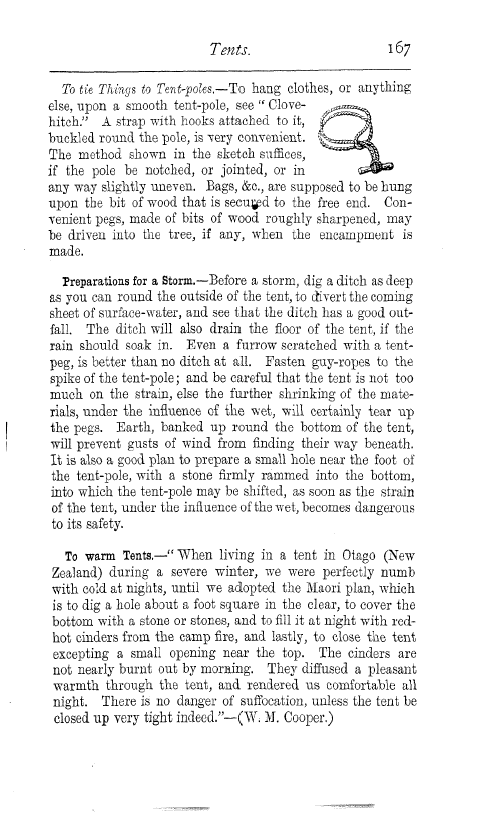Tents. 167
To tie Things to Tent-poles.-To hang clothes, or anything else, upon a smooth tent-pole, see " Clovehitch." A strap with hooks attached to it, buckled round the pole, is very convenient. The method shown in the sketch suffices, if the pole be notched, or jointed, or in
any way slightly uneven. Bags, &c., are supposed to be hung upon the bit of wood that is secu:6ed to the free end. Convenient pegs, made of bits of wood roughly sharpened, may be driven into the tree, if any, when the encampment is made.
Preparations for a Storm.-Before a storm, dig a ditch as deep as you can round the outside of the tent, to divert the coming sheet of surface-water, and see that the ditch has a good outfall. The ditch will also drain the floor of the tent, if the rain should soak in. Even a furrow scratched with a tentpeg, is better than no ditch at all. Fasten guy-ropes to the spike of the tent-pole ; and be careful that the tent is not too much on the strain, else the further shrinking of the materials, under the influence of the wet, will certainly tear up the pegs. Earth, banked up round the bottom of the tent, will prevent gusts of wind from finding their way beneath. It is also a good plan to prepare a small hole near the foot of the tent-pole, with a stone firmly rammed into the bottom, into which the tent, pole may be shifted, as soon as the strain of the tent, under the influence of the wet, becomes dangerous to its safety.
To warm Tents.-" When living in a tent in Otago (New Zealand) during a severe winter, we were perfectly numb with cold at nights, until we adopted the Maori plan, which is to dig a hole about a foot square in the clear, to cover the bottom with a stone or stones, and to fill it at night with redhot cinders from the camp fire, and lastly, to close the tent excepting a small opening near the top. The cinders are not nearly burnt out by morning. They diffused a pleasant warmth through the tent, and rendered us comfortable all night. There is no danger of suffocation, unless the tent be closed up very tight indeed."--(W: M. Cooper.)

